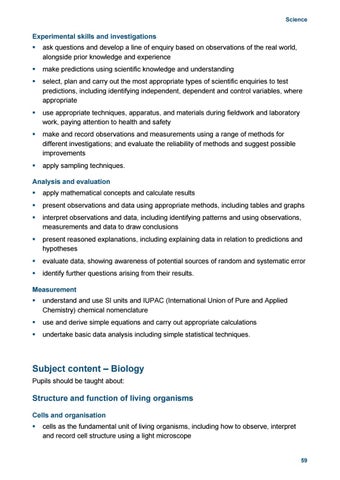Science
Experimental skills and investigations
ask questions and develop a line of enquiry based on observations of the real world, alongside prior knowledge and experience
make predictions using scientific knowledge and understanding
select, plan and carry out the most appropriate types of scientific enquiries to test predictions, including identifying independent, dependent and control variables, where appropriate
use appropriate techniques, apparatus, and materials during fieldwork and laboratory work, paying attention to health and safety
make and record observations and measurements using a range of methods for different investigations; and evaluate the reliability of methods and suggest possible improvements
apply sampling techniques.
Analysis and evaluation
apply mathematical concepts and calculate results
present observations and data using appropriate methods, including tables and graphs
interpret observations and data, including identifying patterns and using observations, measurements and data to draw conclusions
present reasoned explanations, including explaining data in relation to predictions and hypotheses
evaluate data, showing awareness of potential sources of random and systematic error
identify further questions arising from their results.
Measurement
understand and use SI units and IUPAC (International Union of Pure and Applied Chemistry) chemical nomenclature
use and derive simple equations and carry out appropriate calculations
undertake basic data analysis including simple statistical techniques.
Subject content – Biology Pupils should be taught about:
Structure and function of living organisms Cells and organisation
cells as the fundamental unit of living organisms, including how to observe, interpret and record cell structure using a light microscope 59
